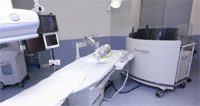Sep 23 2010
Corindus Vascular Robotics has declared the outcome of the first-in-human clinical study its CorPath 200 robotic system, which was conducted at the Corbic Research Institute, Colombia. The company has reported that the Corpath will be showcased at the Transcatheter Cardiovascular Therapeutics (TCT) 2010 conference which will be held in Washington, D.C from September 21 to 25, facilitating the participants to personally experience the system.
The first clinical study of Corpath was performed on eight patients to assess its reliability and technical efficiency in handling stent/balloon systems and coronary guidewires while performing a PCI procedure. The major investigation of this robotic system was performed by Juan F. Granada, M.D., of Skirball Center for Cardiovascular Research, Cardiovascular Research Foundation (CRF). The other participants of this clinical investigation were Juan Andreas Delgado, M.D., Corbic Research Institute and Giora Weisz, Director of Research, Center for Interventional Vascular Therapy, New York-Presbyterian Hospital.
 CorPath 200 Robot
CorPath 200 Robot
Dr.Granada has stated that the clinical trial achieved the first endpoint of zero MACE at 48 hours. He said that the CorPath precisely controlled and delivered the guidewire and other required devices of angioplasty to the targeted area, helping him to conduct the procedure efficiently. He added that rather than standing by the side of the PCI procedure table, the PCI procedure was performed by sitting in the CorPath’s cockpit which facilitated him with better focus and accurate robotic-assisted control on the patient.
According to Dr. Delgado, time consumed by the Corpath assisted PCI operations is same as that of a traditional manual procedure. He added that after the surgery, all the eight patients were discharged with less than 30% stenosis, followed by a month follow-up to establish the non-occurrence of MACE.
Dr. Weisz has said that the robotic system had helped him to perform the surgery without the need of a lead apron since he was sitting in the cockpit. He added that while performing the clinical study of CorPath, he was exposed to only 1.81 µGy of radiation, which is 97% less than what he would have received on wearing a lead apron during the manual PCI surgery. He appreciated the intuitiveness and simplicity of the robotic system.
David Handler, CEO, Corindus Vascular Robotics has stated that the successful clinical study of CorPath 200 robotic system has paved the way for CorPath Percutaneous Robotically Enhanced Coronary Intervention Study ( Corpath PRECISE), which is a single-arm, multi-center, non-randomized study.